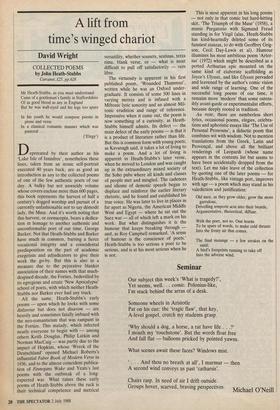A lift from time's winged chariot
David Wright
COLLECTED POEMS by John Heath-Stubbs
Carcanet,125, pp.628 Mr Heath-Stubbs, as you must understand Came of a gentleman's family in Staffordshire Of as good blood as any in England But he was wall-eyed and his legs too spare In his youth he would compose poems in prose and verse In a classical romantic manner which was pastoral. . .
('Elegy')
Deprecated by their author as his 'Lake Isle of Innisfree', nonetheless these lines, taken from an ironic self-portrait executed 40 years back, are as good an introduction as any to the collected poems of one of the few authentic poets of our day. A bulky but not unwieldy volume whose covers enclose more than 600 pages, this book represents the harvest of half a century's dogged worship and pursuit of a currently unfashionable not to say &mode lady, the Muse. And it's worth noting that this harvest, or cornucopia, bears a dedica- tion in homage to another authentic and unconformable poet of our time, George Barker. Not that Heath-Stubbs and Barker have much in common, barring a fierce vocational integrity and a coincidental predisposition on the part of academic exegetists and adjudicators to give their work the go-by. But this is also in a measure due to the pejorative blanket association of their names with that much- despised decade, the Forties, bedevilled by its egregious and ersatz 'New Apocalypse' school of poets, with which neither Heath- Stubbs nor Barker ever had any truck.
All the same, Heath-Stubbs's early poems — upon which he looks with some disfavour but does not disavow — are heavily and sometimes fatally imbued with the neo-romanticism that was rampant in the Forties. This malady, which infected nearly everyone to begin with — among others Keith Douglas, Philip Larkin and Norman MacCaig — was partly due to the impact of Hopkins, whose 'Wreck of the Deutschland' opened Michael Roberts's influential Faber Book of Modern Verse in 1936, and to the almost coincident publica- tion of Finnegans Wake and Yeats's last poems with the outbreak of a long- expected war. What raises these early poems of Heath-Stubbs above the ruck is their technical competence and metrical
versatility, whether sonnets, sestinas, terza rima, blank verse, or — what is most difficult to pull off satisfactorily — vers libre.
The virtuosity is apparent in his first published poem, 'Wounded Thammuz', written while he was an Oxford under- graduate. It consists of some 500 lines in varying metres and is infused with a Miltonic lyric sonority and an almost Mil- tonic erudition and range of reference- Impressive when it came out, the poem is now something of a curiosity, as Heath- Stubbs himself admits. Its defect — the main defect of the early poems — is that it is a product of literature rather than life. But this is common form with young poets; as Kavanagh said, it takes a lot of living to make a poem. And a lot of living is apparent in Heath-Stubbs's later verse, when he moved to London and was caught up in the extraordinary mixed society of the Soho pubs where all kinds and classes of people met and mingled. The cadences and idioms of demotic speech began to displace and reinforce the earlier literary rhetoric, and he found and established his true voice. He was later to live in places as far apart as Nigeria, the American Middle West and Egypt — where he sat out the Suez war — all of which left a mark on his work. But what distinguishes it is the humour that keeps breaking through — and, as Roy Campbell remarked, 'A sense of humour is the conscience of poets.' Heath-Stubbs is too serious a poet to be serious, and is at his most serious when he is not. This is most apparent in his long poems — not only in that comic but hard-hitting skit, 'The Triumph of the Muse' (1958), a mimic Purgatorio with Sigmund Freud standing in for Virgil (alas, Heath-Stubbs has kind-heartedly deleted some of its funniest stanzas, to do with Geoffrey Grig- son, Cecil Day-Lewis et al). Humour illumines his most ambitious poem `Artor- ius' (1972) which might be described as a potted Arthurian epic mounted on the same kind of elaborate scaffolding as Joyce's Ulysses, and like Ulysses pervaded and leavened by the author's comic vision and wide range of learning. One of the successful long poems of our time, it remains more 'modern' than some ostens- ibly avant-garde or experimentalist efforts, because deeply rooted in tradition.
Au reste, there are numberless short lyrics, occasional poems, elegies, celebra- tions and aphoristic essays like 'The Use of Personal Pronouns', a didactic poem that combines wit with wisdom. Not to mention translations from the Greek, Latin and Provençal, and above all the brilliant renderings of Leopardi (whose name appears in the contents list but seems to have been accidentally dropped from the text). Let me take leave of the collection by quoting one of the later poems — for Heath-Stubbs, like vintage port, improves with age — a poem which may stand as his valediction and justification:
Old men, as they grow older, grow the more garrulous,
Drivelling temporis acta into their beards, Argumentative, theoretical, diffuse.
With the poet, not so. One learns To be spare of words, to make cold thrusts Into the frosty air that comes.
The final message — a few strokes on the sand; A bird's footprints running to take off Into the adverse wind.














































 Previous page
Previous page